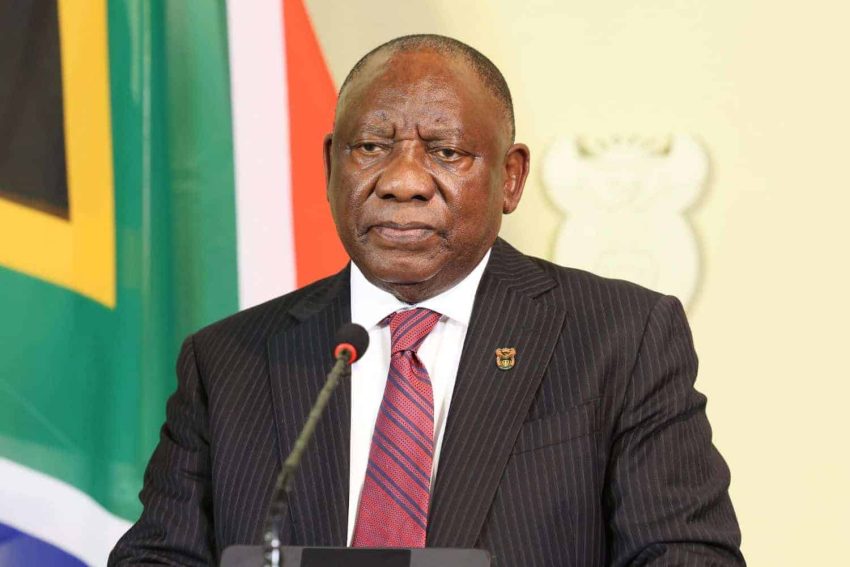Presidential spokesperson slams critics’ ‘hypocrisy’.
The DA has accused President Cyril Ramaphosa of praising Zimbabwe’s ruling party, Zanu-PF, for implementing controversial land reform policies.
This comes after Ramaphosa gave a controversial speech during his working visit to Harare over the weekend.
He was a guest speaker at the official opening of the Zimbabwe Agricultural Show.
What did Ramaphosa say?
In his speech, Ramaphosa said South Africa and Zimbabwe have a similar history of land dispossession.
He said it was necessary for the government of Zimbabwe to take measures that would remedy the situation that black Zimbabweans who were landless found themselves in.
“Most of the country’s commercially productive land and large-scale commercial farms were owned by whites. The black majority was confined to communal lands and all but completely excluded from commercial farming.
“This mirrored our own experience in South Africa.
“It was therefore essential for both historical redress and food security, development and economic growth, that the government embarked on ambitious reforms to facilitate the entry of black Zimbabweans into productive agriculture, including support to small-scale farmers,” said Ramaphosa.
Why is the DA concerned?
However, the DA has taken exception to Ramaphosa’s comments. They described them as praising Robert Mugabe’s party.
Two decades ago, Zimbabwe was marred by farm invasions, which were part of a land reform policy known as the Fast Track Land Reform Programme (FTLRP). This policy resulted in the mass displacement of farmers and had negative economic effects.
DA spokesperson Willie Aucamp said Ramaphosa’s comments are irresponsible.
“The DA condemns and rejects this praise by Ramaphosa for a process which left Zimbabwe in tatters, destroying its economy, destroying its foreign relations, and creating famine for its people,” said Aucamp.
Human rights abuses in Zimbabwe
He said the land reform policies in Zimbabwe violated human rights and condoned illegal actions.
“Land was not legally transferred, the failed Zimbabwe model praised by Ramaphosa led to crippling financial reparations being due to former farmers and land owners.
“Ramaphosa is attempting to whitewash the disaster in Zimbabwe, to create momentum for the ANC’s land expropriation agenda in terms of the Expropriation Act of 2025,” said Aucamp.
Aucamp said Ramaphosa’s comments do not represent all the parties in the government of national unity (GNU).
“The DA, as a governing partner in South Africa’s government of national unity, reiterates that it is not an agreed or formal policy of the South African government to endorse Zimbabwe’s land confiscation programme,” he said.
Presidency spokesperson Vincent Magwenya accused the DA of being out of touch with the solidarity that the South African government has built with neighbouring countries.
He explained that Zimbabwe is a crucial trade partner for the South African government.
“Over 120 South African companies are doing business in Zimbabwe in various sectors, including, among others, mining, aviation, tourism, banking, property, retail, construction, and fast food.
“In 2024, South Africa exported R69.21 billion worth of goods and merchandise to Zimbabwe, compared to R57.5 billion in 2023.
“Vegetables were the main exports and contributed R11.9 billion to the total exports to Zimbabwe,” he said.
Is the DA anti-transformation?
Magwenya said the DA should be more concerned about addressing issues of transformation in South Africa, rather than in foreign countries.
“Can the DA lead that campaign? They stand against every form of transformative and redressal law here in South Africa, but they scream for redress in Zimbabwe. It’s hypocrisy at its very best, raw and unhidden,” he said.
Plans to reset the GNU
Meanwhile, ANC secretary-general Fikile Mbalula told reporters on Monday that the ANC has plans to “reset” the GNU.
He made it clear that the ANC is in a difficult working relationship with the DA.
The two parties have been squabbling over matters of foreign policy for months.
“We will engage about the GNU in the next two or three weeks, resetting the button. We will work with all political parties in the GNU. Going forward to ensure that the GNU becomes stronger,” he said.
Mbalula said the ANC is working hard on its renewal programme with the hopes of retrieving its lost support in communities.
“Today we find ourselves looking at Helen Zille, something that we never thought we would do in our lives,” he said.
ALSO READ: Full implementation of Bela Act bruises DA’s ego
Analysis of the ideological battle between the DA and ANC
Theo Neethling, a political analyst from the University of Free State (UFS) told The Citizen on Tuesday that the clash between the DA and the ANC reflects not only a policy debate but also a deeper contestation over South Africa’s economic trajectory.
He said the debate between the two parties centres on whether the path to justice and growth lies in market-driven reforms anchored in property rights, or in state-driven redistribution aimed at addressing historical dispossession.
“The ANC, by contrast, has consistently supported state-led interventions in land reform as part of a broader redistribution agenda.
“Its endorsement of expropriation without compensation—albeit in a modified form—reflects its willingness to use state power to address historical inequalities,” he said.
NOW READ: DA declares war on B-BBEE system
